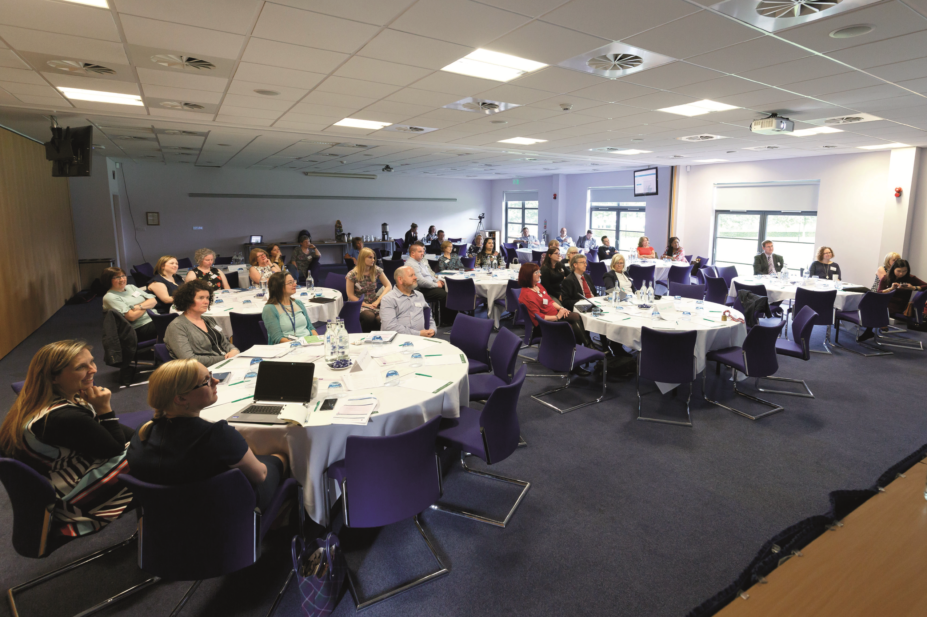
Mark Ferguson / Royal Pharmaceutical Society
Health literacy, revalidation and the Scottish government’s strategy for pharmacy ‘Achieving Excellence in Pharmaceutical Care’ were high up the agenda at the 2017 Scottish National Seminar.
The event, held in Stirling on 30 September and 1 October, brought together 150 delegates to hear and share ideas under the overarching theme of “Pharmacy for the Future: Building on Strong Foundations”.
Speaking on the first day of the event, Angela Shepherd, NHS Education for Scotland (NES) nursing and midwifery practice educator with NHS Tayside, said that instructions given to patients by healthcare providers were often “not as simple” as we thought. In Scotland, she said, 23% of the population had “very poor” literacy skills, whilst 32% of people had “weak” skills.
Improving health literacy
Such people are likely to also experience poor “health literacy”, in which people struggle to understand verbal and written health information and have increased difficulty accessing healthcare services. “Poor health literacy is equated with health inequality, without a doubt,” Shepherd said.
Shepherd added that lower health literacy was not confined to those with lower general literacy: the traveller community; those with learning disabilities or cognitive impairments; those whose first language is not English; and the elderly may all experience some degree of difficulty.
Potential flags for low health literacy, she said, included incomplete forms; non-compliance with medication regimes and frequently missed appointments.
To ensure that patients are taking away clear, correct information, Shepherd said that she made use of the teach-back method in which a patient is asked to explain, in their own words, what they have understood from the consulation.
On Day Two, Graham Kramer, a Montrose-based GP and part of the team behind ‘Making it easy: a health literacy action plan for Scotland’, shared his own experiences of improving health literacy.
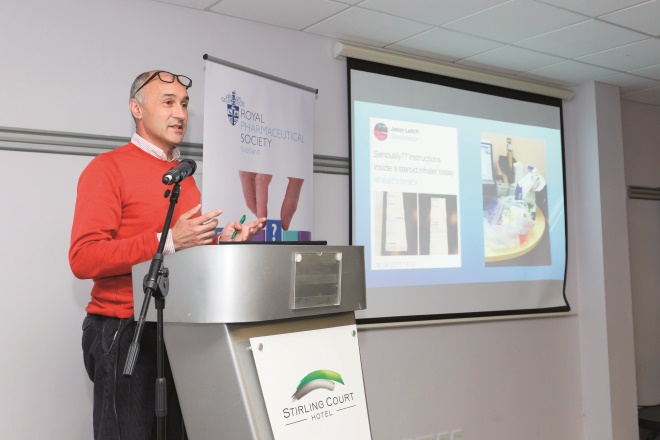
Source: Mark Ferguson / Royal Pharmaceutical Society
Graham Kramer was one of two speakers who focused on health literacy
“Half of what a person hears in a medical consultation is forgotten, and half of what they do remember is misunderstood,” Kramer said. “A lot of people are going away with very little meaningful information”.
The Scottish Government is currently undertaking a refresh of Making It Easy, Kramer said. The new document, Making it easier, has been released in draft form and the final version will be published later this year. “We want Scotland to be a health literate society,” Kramer said. “Healthcare places barriers in front of people — is it, perhaps, our job to remove these barriers and make it easy for people?”
Both Shepherd and Kramer made the point that it was a healthcare practitioner’s responsibility to ensure their instructions were understood.
“Current definitions of health literacy place the problem with the patient, but health is complicated”, Shepherd said. “We shouldn’t just focus on the ability of users: we should also emphasise the skills of caregivers.”
Kramer said that while we tried to cater for physical disability, we struggle to make it easy for people with intellectual disabilities, or difficulties with reading, writing, and comprehending health information, we must try to remove these barriers.
Both Shepherd and Kramer referred pharmacists to The Health Literacy Place, an online resource from NHS Education for Scotland that signposts to heath literacy resources and allows healthcare practitioners to share ideas and best practice for improving health literacy amongst their patients.
Scottish strategy
Scottish chief pharmaceutical officer, Rose Marie Parr, provided delegates with an overview of ‘Achieving excellence in pharmaceutical care’, the Scottish government’s strategy for improving the delivery of pharmacy services in Scotland. Outlining the nine commitments that embody the strategy, Parr said the strategy should be viewed as “a living thing that we take forward together”.
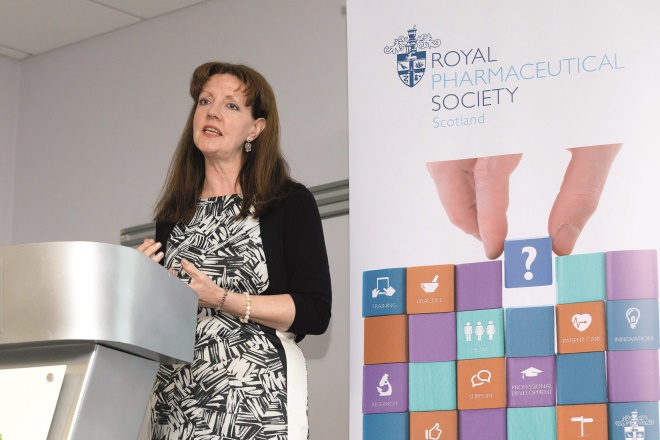
Source: Mark Ferguson / Royal Pharmaceutical Society
Rose Marie Parr briefed delegates on the Scottish government strategy, Achieving Excellence in Pharmaceutical Care
Parr acknowledged that times were challenging. Hospital pharmacists, she said, often struggled to find time to complete medicines reconciliation and discharge planning; patients in deprived remote and rural areas often had no access to pharmaceutical care, and there were “issues around variation and waste in care homes”. However, the Scottish workforce was, she said, “skilled, committed and competent”, and building on the sector’s “enthusiasm” could improve the nation’s pharmaceutical care — particularly around care homes, where pharmacists can “bring sense” to prescribing.
Parr also made the point that medicines licensing was not devolved.
Ready for the future
Beth Ward, head of professional development with the Royal Pharmaceutical Society’s (RPS) Professional Development and Support team, briefed delegates on the GPhC’s proposed changes to the revalidation process, and on the support the Society will offer pharmacists as they navigate the changes. “Our key message is: don’t worry”, Ward said, assuring members that “the RPS has been working on this for some time to make sure that everything is in place. We will have a full package of support available for everybody”.
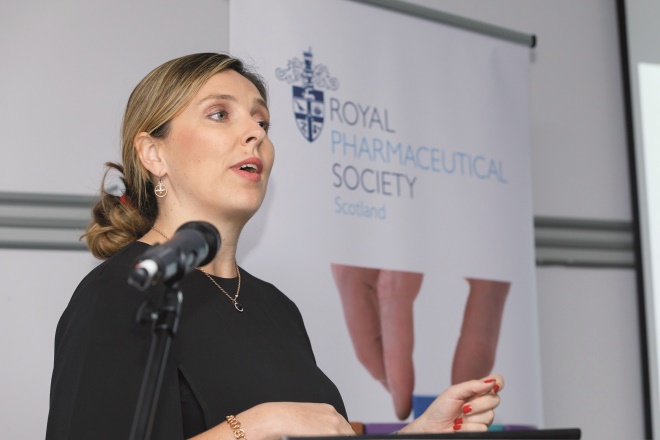
Source: Mark Ferguson / Royal Pharmaceutical Society
Beth Ward assured delegates that the RPS would support them through proposed changes to revalidation
Tom Byrne and Mara Gilchrist, representing the British Pharmaceutical Students Association (BPSA) presented a summary of the BPSA’s report, ‘Aspirations and expectations of pharmacy students’. The report, based on a survey of 1374 students, sets out the aspirations and expectations of current pharmacy students as they look to their future careers. The vast majority (92.5%) of respondents hoped to be able to prescribe medicines — a response that, Byrne said, tied in well with the Scottish government’s commitment that by 2023, all pharmacists should be independent prescribers.
Putting heads together
Running throughout the event were a series of workshops with delegates forming smaller groups to share ideas and best practice experiences around specific issues in pharmacy. Themes for discussion included acute and chronic pain management, improving mental health and well-being, and how to deliver better pharmaceutical care in care homes.
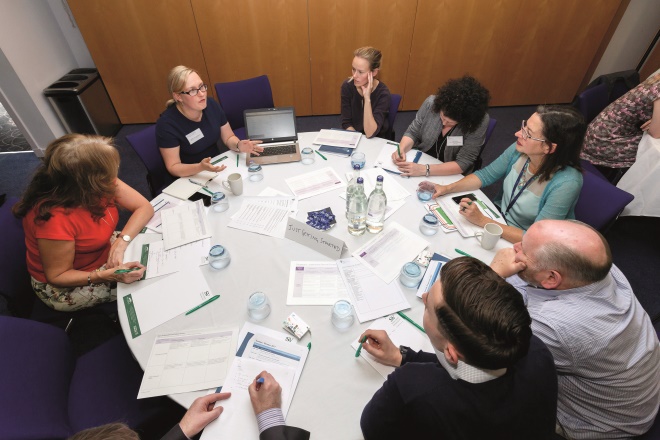
Source: Mark Ferguson / Royal Pharmaceutical Society
A range of workshops allowed delegates to share ideas and experiences to support best practice
Leading the group discussion on chronic and acute pain, Elaine Thompson, team leader for the Dundee Locality Pharmacy Service and a member of the Scottish Pharmacy Board, said that chronic pain was not yet recognised as a long-term condition, and so “we don’t have robust services across the country”. Contributing to the session, Deborah Steven, lead pharmacist for Fife’s Pain Management Service, said that one issue she saw in chronic pain was that patients were put on medications and then were never reviewed, remaining on the same medications long-term, when this may no longer have been appropriate.
Leading the discussion on improving mental health, Gordon Johnston, chair of Bipolar Scotland, said that whilst he had found antidepressants and other medications beneficial, some patients were given medications that work for the conditions initially, but then remained on those medications for months or years, by which time their circumstances may have moved on.
Many people take medications for years and don’t fully understand why, Johnston added. “Nowadays, more people want to know about what their drugs do; what the side effects are, and how long the medicines are needed for. This is an important role for pharmacists.”
Johnston also said that in his experience, whilst many GPs were happy to change their patients’ medication where physical conditions were concerned — for example, to a drug with fewer side effects — they might be less confident adjusting medication for mental health conditions. “So ask someone on repeat prescriptions how long they’ve been on them, and if the side effects have been explained.”
Speaking to the group discussing care homes, Thomas Ross, a lead pharmacist with NHS Highland, said he would like to see examples of polypharmacy reviews in care homes. Francesca Aden, a pharmacist consultant, said that she considered multidisciplinary links to be “really key”: which also included communicating with the patient’s family. When medicines use reviews, for example, are undertaken, there have been examples where families who were not included in the review would complain, resulting in the patient’s GP reversing the changes made.
Summing up at the end of the two days, John McAnaw, chair of the Scottish Pharmacy Board, said that the next steps for RPS Scotland were to “reflect on the contributions gathered from workshops, and from talking to delegates”, to help inform how the Society took forward its business plan for 2018.
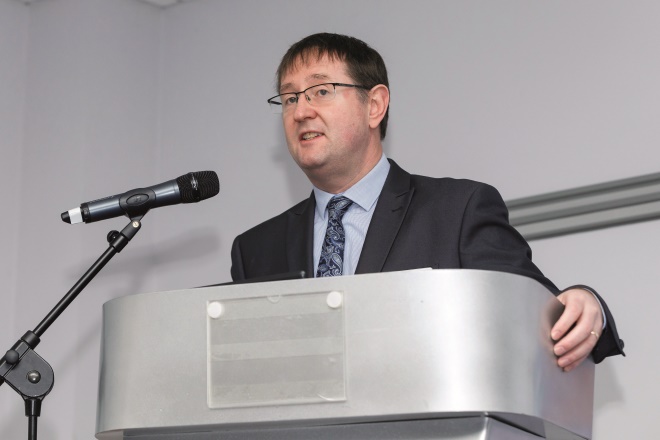
Source: Mark Ferguson / Royal Pharmaceutical Society
John McAnaw pledged that the Scottish Pharmacy Board would reflect on the outcomes of the seminar
The conference outputs would also, he added, “help us focus on how we can best support you in practice, and push for the changes that we know are required”.
You may also be interested in
Long service of members

Membership fees 2022
